Introduction
Although wireless routers have become more affordable and common in many network configurations, they are not always necessary or appropriate. A wired router connects multiple computers to a LAN and a wide area network (WAN), such as the Internet. For the fastest data transmission speeds, most modern wired routers provide 10/100 Mbps connections, and Ethernet cables are commonly used for these connections. In this article, we have compiled a list of the best-wired router available.
Consider how many systems you want to connect to your LAN before purchasing one of these devices, as they frequently have varying numbers of ports for constructing a network. Optional features that differ from one router to the next include firewalls and basic network controls.
The Wired Router can then direct traffic from LAN devices to the Internet because it is connected to the Internet (via its WAN port).
Despite the fact that the equipment appears to be quite old… They are unrivaled in terms of connectivity, speed, and firewall security especially if you want to be more “hands-on” with your team management. Although standard SOHO wireless routers are frequently less flexible and powerful than wired routers, you may require some networking knowledge to fully utilize their features.
Without lag or packet loss, wired routers can frequently support high-speed internet connections and Gigabit Internet plans.
The extensive software capabilities of wired router systems are another critical component. VPN, QoS, firewall controls, deep packet inspection for application security, and a variety of other features are available.
Wireless routers, without a doubt, are now widely available and provide fast speeds. However, the speeds are still slower than with a cable connection. Wired connections are unquestionably more reliable and provide better internet service.
Having said that, if you need a wired router for your home or business, this is the post for you. Our team has already identified some of the best-wired routers available. However, before choosing one, make sure the following factors are present:
Speed:
Ethernet Ports will be used in this scenario because these routers provide wired connectivity. While some have 10/100Mbps ports, they are more than adequate. If you require more speed, there are options with speeds of up to 1Gbps.
Number of Ports:
A wired router is responsible for allocating internet bandwidth to multiple devices. It is critical to confirm the number of LAN connections provided by the router. Furthermore, if you use connections from different ISPs, multiple WAN ports should be available.
Security:
Keep your connection safe from outside threats such as intrusion at all times. To accomplish this, most wired routers include hardware firewall systems and other network security features.
Furthermore, if this is your first time purchasing a wired router, you should read the comprehensive “Buying Guide” provided in the section below this article. Meanwhile, check out the list to see what the best-wired routers have to offer!
Best Wired Router 2023
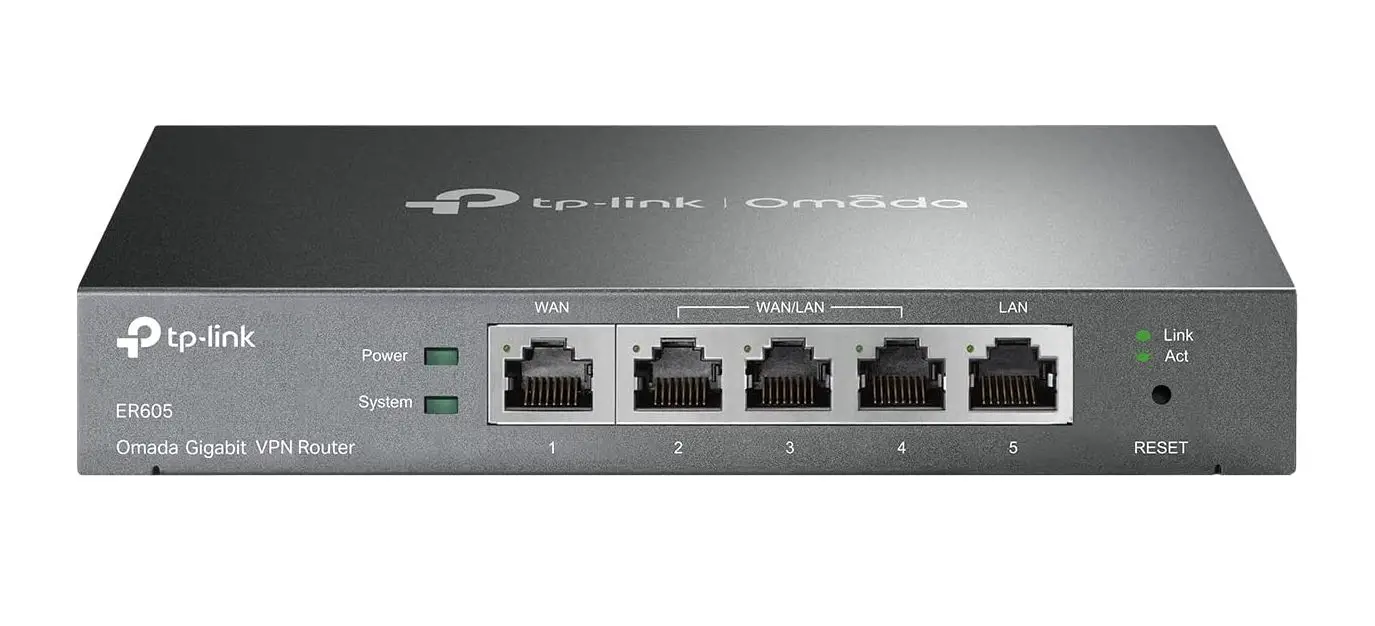
TP-Link ER605 Multi-WAN Wired VPN Router
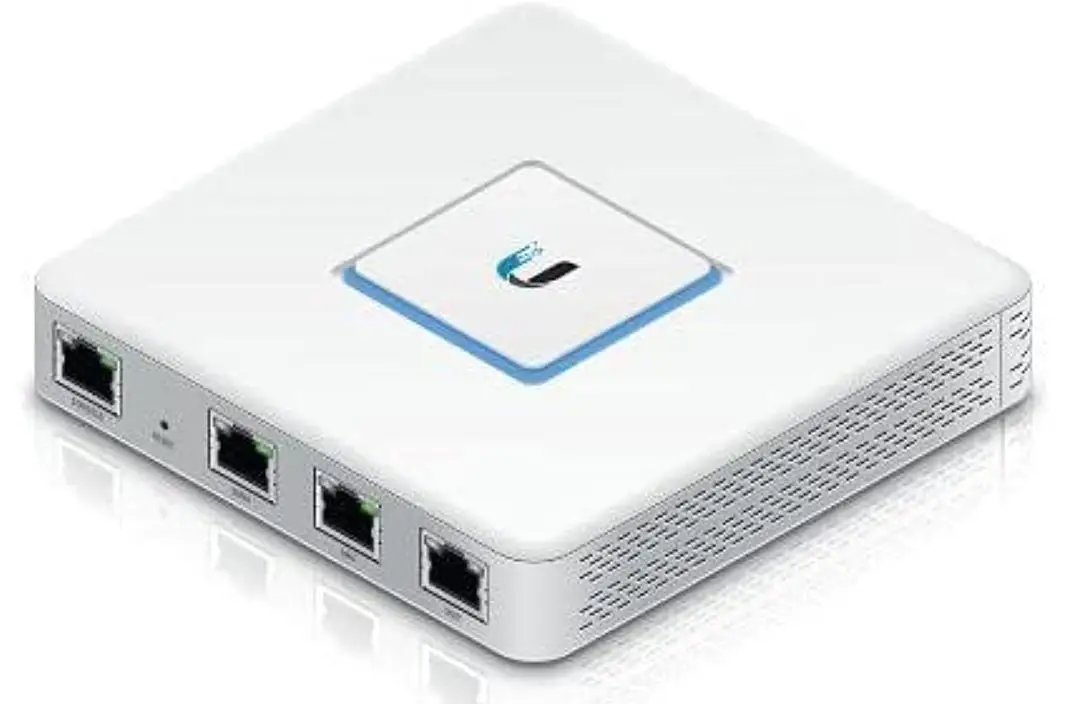
Ubiquiti Unifi Security Gateway (USG)
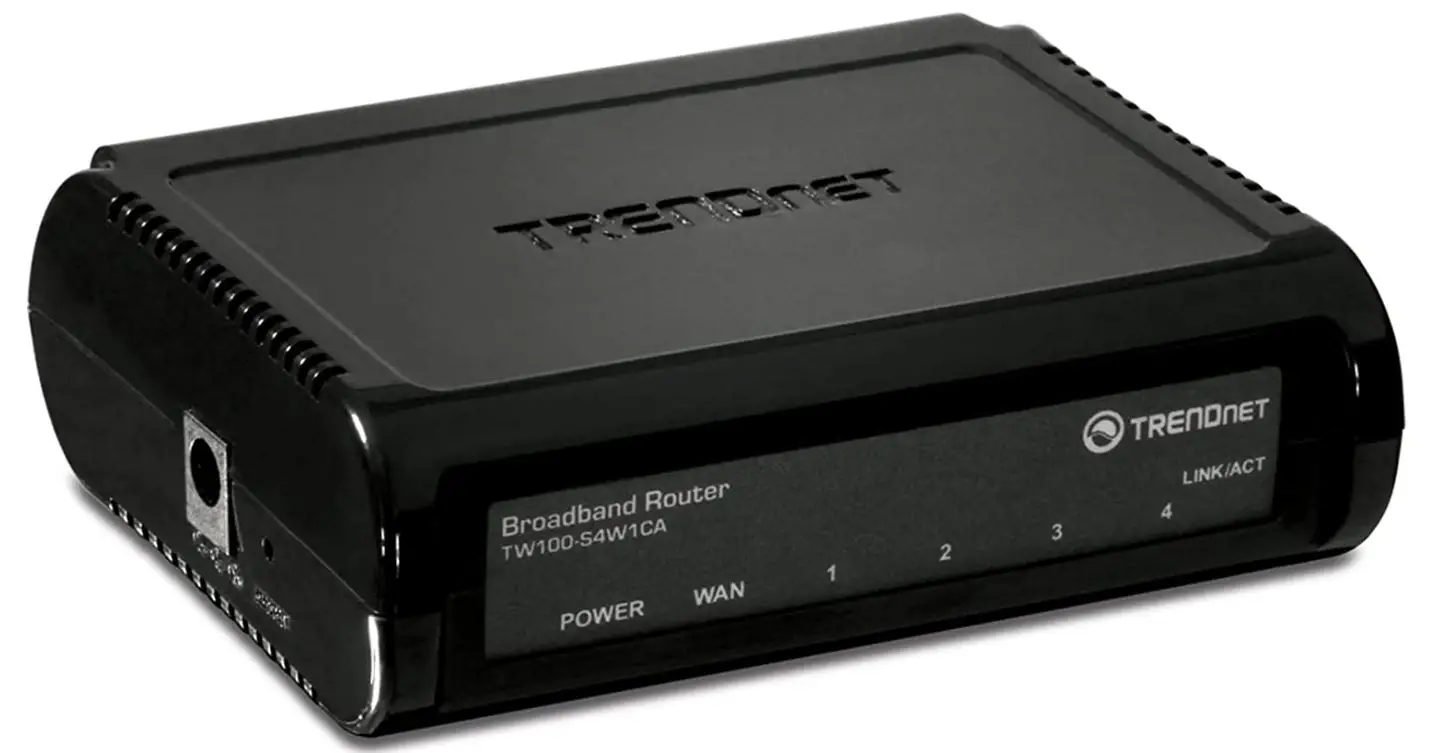
TRENDnet TW100-S4W1CA 4-Port Broadband Wired Router
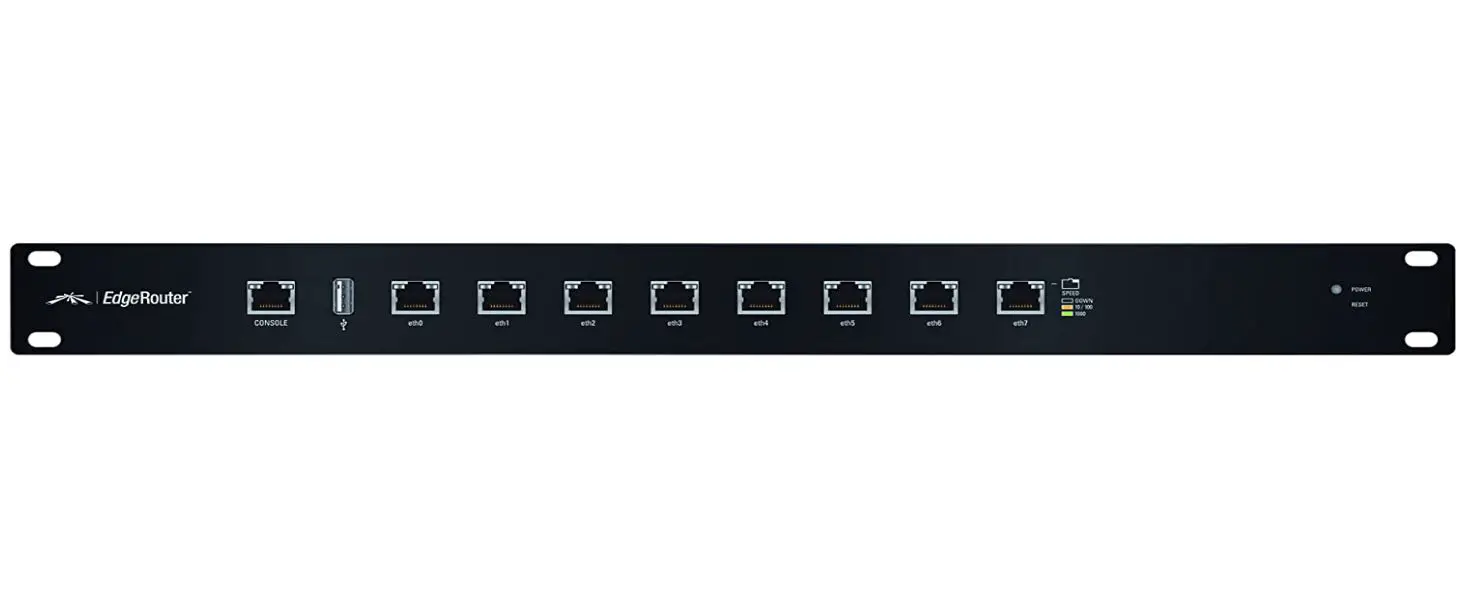
Ubiquiti Networks Wired Router
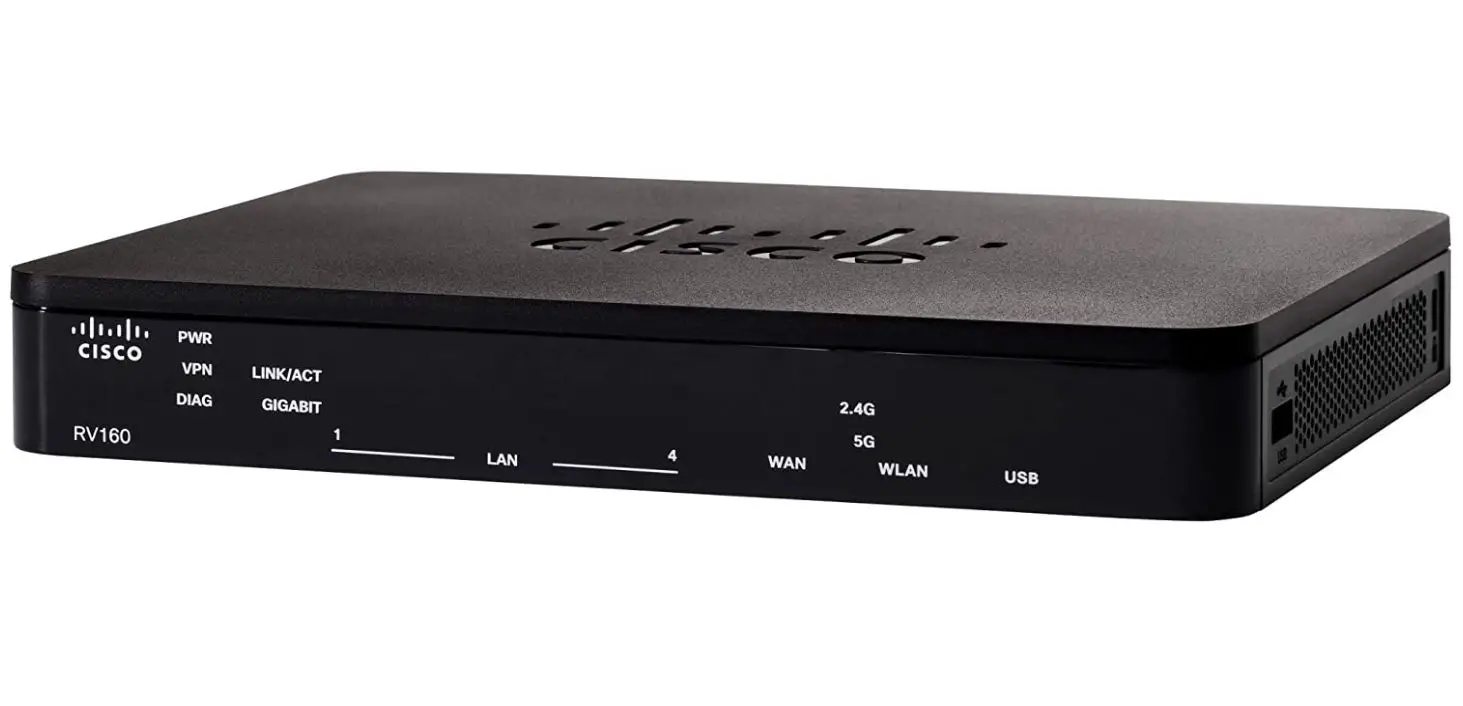
Cisco RV160 Wired Router
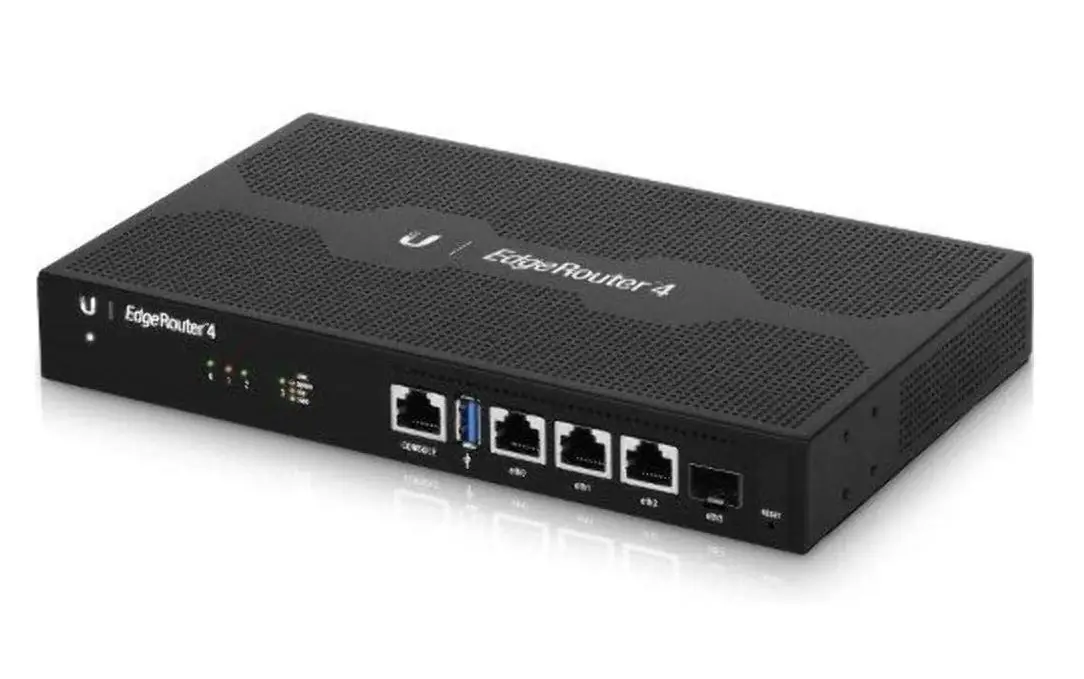
Ubiquiti EdgeRouter 4 wired router
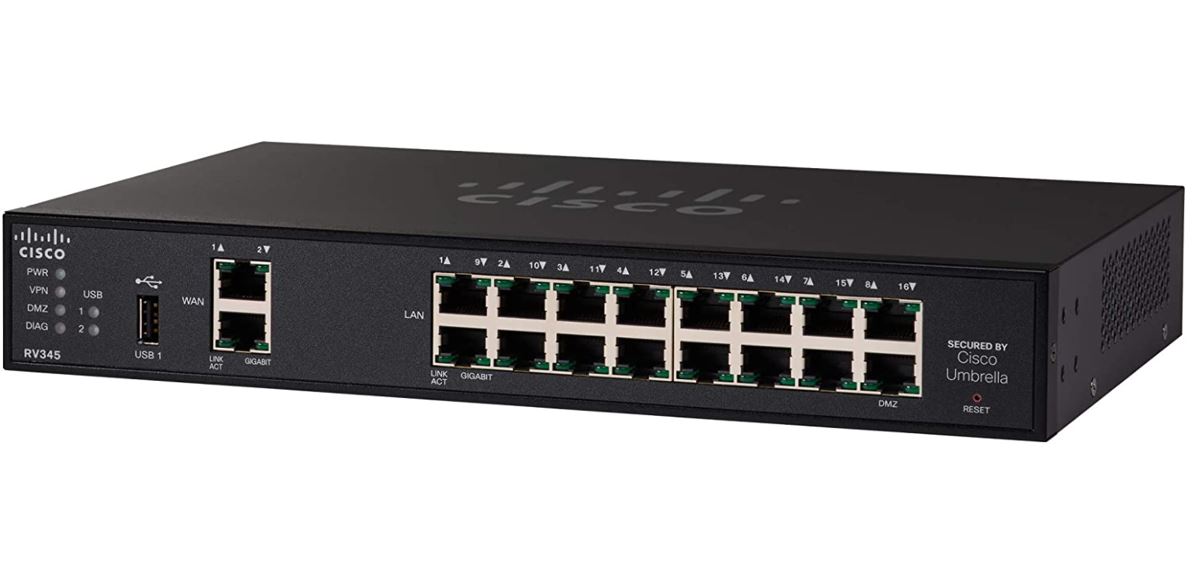
Cisco RV345 VPN Wired Router
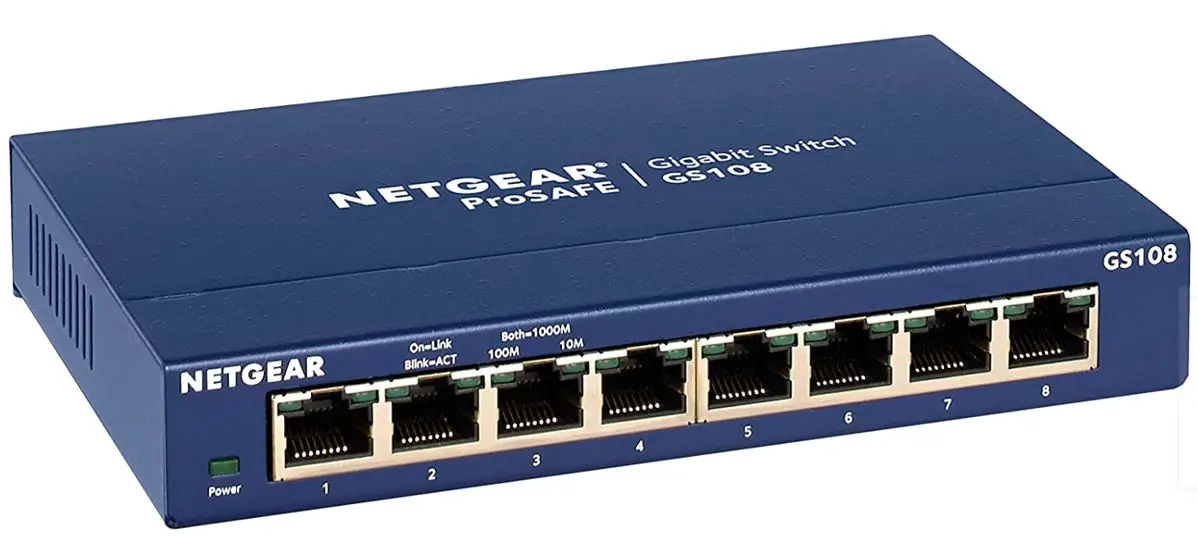
NETGEAR 8-Port Gigabit Ethernet Wired Router

One dedicated WAN port, three WAN/LAN ports, and one dedicated LAN port are available on the TP-Link ER605 wired VPN router. It is also a very secure router because it supports multiple VPN connections.
Thanks to features like flexible traffic control, users will be able to monitor network capacity while also optimizing utilization for each connection. The ER605 has sturdy metal housing that can be used in a variety of applications, as well as a compact design that makes installation a breeze. A few users, however, have reported firmware issues.
The router includes a strong firewall to protect the network and data from online threats, as well as a speed test feature for customers to test the speed of their network. Owners will also appreciate how simple it is to operate the router remotely thanks to the use of the Omada Software Defined Networking Platform.

Don’t base your assessment of this wired router model on its size or appearance.
Ubiquity is well-known for its high-quality networking products (WiFi access points, Ethernet switches, routers, etc). The Unifi Security Gateway (USG) is no exception to this rule.
USG, as the name implies, operates under the UniFi umbrella and is an excellent choice if you already have Ubiquity devices in your network (although it works perfectly as a standalone device as well).
Suppose you have other Ubiquity devices (access points, switches, etc.) in your network. In that case, you can use a centralized management system (Unify Network Controller) to provide a single point of access and management for all devices in your network.
USG is also a very cost-effective option. Although marketed as a hardware firewall, the device is also a very powerful router.
The device has one Gigabit WAN port, one Gigabit LAN port, and another LAN/WAN port (Gigabit).
USG is powered by a MIPS64 processor with hardware capable of packet acceleration when required.
If you only use the USG for routing and are connected to a gigabit Internet service, you can achieve a full 1 Gbps speed. However, enabling Deep Packet Inspection (DPI) reduces throughput.
When it comes to setting up a home network, one of my primary concerns is security. Fortunately for you, this USG device includes both excellent firewall and routing capabilities.
It’s incredible that this small device also includes IDS (Intrusion Detection System). The IDS scans network traffic for known attack signatures and blocks them at the network level.
Another feature I like about this router model is that it is silent and can run continuously for hours. The ubiquity isn’t even equipped with a fan.

The TRENDnet TW100-S4W1CA is a small wired router with four Ethernet ports and a data transfer rate of up to 100Mbps. The router includes NAT capability to protect against PC hacking and is intended for users with high-speed Cable/xDSL Internet access.
It’s incredibly simple to set up thanks to the simple web browser settings, and it’s much easier to use because it also supports remote management. Unfortunately, because it does not restrict external IP addresses, it may irritate some users.
This 4-port broadband router can connect up to 253 users to the Internet using a single Internet service provider account and supports numerous VPN pass-throughs. Its support for static routes, virtual servers, and the ability to grant or deny access based on MAC address will be appreciated by users.

Another well-known brand that manufactures devices and provides networking and IT services is Ubiquiti Networks.
As a result, because it is one of the most expensive and well-built routers on the market, this wired router is ranked second. Because of its rackmount design, the ER-8 Edgerouter is unique in that it can be quickly attached to any rack.
All mounting nuts and screws are included in the package. This wired router has a dual-core 800MHz CPU and 2GB DDR3 RAM.
It goes without saying that a device capable of managing up to eight devices simultaneously necessitates this level of processing power. This wired router has eight Gigabit Ethernet (10/100/1000) RJ45 ports, one WAN port, and one USB port.
The router can send 2 million packets per second thanks to hardware-accelerated routing.

Cisco, as you may be aware, is a market leader in the IT and networking industries and has long provided high-quality networking equipment.
We chose the company’s high-quality wired router option because we knew you’d like it. The Cisco RV160 VPN router is a secure choice for business owners due to its IPsec VPN capabilities and hardware firewall protection for secure browsing and site-to-site communication.
This wired router has four Gigabit Ethernet ports, each of which can deliver speeds of up to 1000Mbps, making it ideal for businesses, home offices, restaurants, and other similar establishments. This router, despite its high price, only has one usable 1 Gigabit WAN port.
The Cisco AnyConnect Secure Mobility Client support on this router, which enables remote management, is a standout feature. Its performance is excellent, with a NAT throughput of 600Mbps and a VPN throughput of 50Mbps. All Cisco products include a limited lifetime warranty, which you will appreciate.

Although it is one of the most powerful router models in this post, it may not be the best choice for someone who is new to networking.
The EdgeRouter 4 is managed by a fully functional administration GUI (web-based) with extensive configuration options. To fully utilize its capabilities, however, you must first understand some networking fundamentals.
If you don’t use any Deep Packet Inspection (DPI) or Quality of Service (QoS) features, the ER-4 can easily handle gigabit speeds if you have a gigabit Internet connection.
Even with the aforementioned capabilities enabled, the device’s speed can exceed 500 Mbps, which is quite impressive.
Another feature that appeals to me is the ER-4’s ability to use all of its interfaces (three Gigabit plus one Gigabit optical SFP port) in any configuration, such as LAN ports, WAN ports, mixed ports, and so on.
The ER-4 is an excellent choice for a commercial setting that requires a lot of internet traffic.

Cisco is my preferred brand for network routers for small and large business networks.
The majority of people, I believe, would agree with me. I prefer Cisco as a networking brand for a variety of reasons. This brand’s products all have a distinguishing feature that makes our lives easier.
Consider the RV345 as an example. One of the reasons I think this model is a good choice for small business networks is that it has 16 Gigabit Ethernet LAN ports. You can do a lot with them if you add two WAN ports.
You won’t need a second Ethernet switch to connect your company’s hosts to the network because the router has so many ports.
If you want to provide Internet redundancy to your network, connect a 3G/4G modem to one of the USB ports to serve as a backup connection to the Internet (via the mobile network) if the WAN fails.
I also appreciate that this device supports Cisco Umbrella. Cisco Umbrella, a DNS-based cloud security service, safeguards all devices in your LAN network against a variety of security threats (phishing, ransomware, malware, bad domains, etc).
Some people are dissatisfied with this router type because they are unable to set it up.

If you want to improve the utility of your modem, you need a product that lives up to its surroundings. As a result, the manufacturer claims that this model is one of the best-wired home routers. Because of its good performance and operation, as well as its other strengths, this model falls into the intermediate category.
Furthermore, its eight Gigabit Ethernet ports provide all of the inputs required by your home’s devices. Connect all of your devices quickly and easily. Connecting your device is simple and requires no additional software because it is plug-and-play.
This model considers energy efficiency. Its design aims to use as little energy as possible during operation. This model also meets quality, dependability, and performance requirements.
This product achieves a good balance of efficiency, performance, versatility, and low cost. It is ideal for households with a large number of Ethernet-connected devices and computers.
Wired Routers vs Other Routers
A wired router is distinguished from other types of routers by the fact that it requires physical connections and frequently lacks wireless functionality. The majority of routers on the market today, on the other hand, support both wireless and wired connections.
However, in a few areas, wired routers outperform their wireless counterparts. To begin, wired routers almost always outperform wireless models when comparing identical speed specifications. This is due to the fact that devices are connected to the router via a dedicated cable. They don’t have to share bandwidth or manage Quality of Service (QoS) protocols to prioritize one device’s activities over another.
Similarly, wired routers are far more secure than their wireless counterparts, making them an excellent choice for anyone concerned about data breaches. Wired routers only provide physical internet access, whereas wireless internet relies on a broadcasted signal that technically anyone within range can access. If you believe a wireless router would be more convenient, look for a top-rated WiFi router with a long-range so you aren’t so restricted in range.
However, there are two situations in which wired routers may be preferable to wireless models. To begin with, your total internet access is limited. You can only connect as many devices as your computer has available ports. In most cases, there will be no more than a few ports. Many wireless routers, on the other hand, can support an incredible number of device connections, with some routers supporting more than 200 wireless devices.
A wired router, on the other hand, necessitates the use of cables. While this implies a stable connection free of lag or congestion, it also implies that you must consider cable length and how you will manage all those wires. If you don’t have access to longer cables, place your router near your devices. Even if you have a longer cable, you’ll need to figure out how to keep those wires tidy.
Is a Wired Router Worth Buying?
- You’re a Power Internet User: If your internet bandwidth is consistently throttled on a wireless network, whether due to gaming, streaming entertainment content, or simply sending and receiving large files, it may be time to switch to a wired connection. In that case, you’ll want the best Xbox One and PS5 gaming routers.
- You Want Faster Speeds: Again, most internet users will not be able to achieve the advertised speeds that their ISP promises. However, a wired connection is almost always faster and more reliable than a wireless connection.
- You’re Concerned About Data Breaches: Wireless networks are convenient, but they are also extremely easy to compromise — especially if people fail to follow basic protocols such as changing their router password from the factory default. Most wired routers, on the other hand, include enhanced security protocols. A wired connection is also much more difficult to breach than a wireless connection.
Buying Guide for the Best Wired Router
Despite the fact that the list has already highlighted some of the best Wired Router options. It can be difficult to choose the best gadget for you if you are shopping for the first time or are unfamiliar with its features. You should not be concerned because we will make this task much easier for you by including all the necessary information in this purchasing guide. Please thoroughly read our buying guide before selecting the best-wired router from the list above.
WAN Ports
Every wired router has a WAN port for connecting to your ISP’s internet service. Most of the time, the router’s single WAN port is sufficient. If you have a backup Internet service provider, your wired router may require more WAN ports. As previously stated, some of the best Wired Routers on the market have up to four WAN ports and support simultaneous connections to multiple ISPs.
It’s also worth noting that Gigabit WAN ports can support speeds of up to 1000Mbps. Conventional ones, on the other hand, can only provide up to 100Mbps of speed.
Speed
Make sure you know what type of internet connection you have and how much speed your internet subscription provides before purchasing a router. You will undoubtedly need adequate internet speeds if you want to use a wired router in your office or place of business. As a result, signing up for a 1Gbps plan is a good idea. Most users will be fine with a 100Mbps connection.
You can select a router based on the speed of your internet connection. Even if your plan only provides 100Mbps, you can still buy a 1Gbps router because you can upgrade your plan while keeping your current router.
Security
Wireless networks are far more secure than wired connections. The majority of wired routers come equipped with cutting-edge hardware firewalls and support for multiple VPN protocols, which improve connection security and protect users from online threats. As a result, by checking the security features on a regular basis, you can ensure that the router will provide you with a secure browsing experience.
LAN Ports
The LAN and WAN ports are identical and use the same RJ45 connector. You can choose a wired router based on how many devices you intend to use at the same time. Up to four LAN ports and even eight LAN ports are available as options.
In other words, a four-port wired router can connect to four devices at the same time, whereas an eight-port router can connect to eight devices at the same time. Furthermore, Gigabit Ethernet LAN ports can support data rates of up to 1Gbps. However, basic 10/100 LAN ports are limited to 100Mbps.
Setup
If you’re new to networking and don’t know how to set up a router properly. Then, steer clear of options that require a lengthy configuration procedure. As an alternative, we’ve put together a list of the best-wired routers that are easy to set up and configure. Purchasing an easy-to-use router can help you save not only time but also money. You will save money, however, because you will not need to hire a networking expert to do the work.
VPN
Check to see if your router has a secure VPN connectivity feature if you need to connect to your network from a remote location. Routers that support VPN protocols such as IPsec, L2TP, or PPTP provide adequate and secure network access.
Router Configuration
Make sure the router you choose is simple to install and configure. If you lack prior knowledge in this area, you may need to seek outside assistance if installation problems arise. You can use your device right away if your router has a simple configuration process. It will also save you money and time on professional equipment installation.
Warranty
Finally, if you are concerned about the warranty, you can investigate it. TP-link and Cisco, for example, offer a lifetime warranty on their products as well as free, round-the-clock technical support. However, because all of the items on the list are well-made and functional, you may never need to use a warranty.
Frequently Asked Questions
What are Wired Routers?
If an ethernet cable is used instead of WiFi, any router, including those that provide wireless internet access, such as the best router for Cox internet service, can be considered a wired router. Network equipment such as wired routers does not support wireless connectivity. These routers only support Ethernet, WAN, and LAN connections.
You will benefit from receiving internet speeds comparable to those guaranteed by your subscription. It is critical to remember that achieving the speeds promised by your internet service provider in actual use (especially for residential users) is nearly impossible (ISP). However, because your device is directly connected to the internet via a wired router, your speeds will often be faster than those on a wireless network.
The total number of ports available determines the maximum number of devices that can be connected to a wired router. Even better, when it comes to security, wired routers are usually the better choice. Unlike a wireless network, a direct physical connection exists between the router and the device, making hacking more difficult.
Why You Should Buy a Wired Router?
Even though wireless routers are the most popular option for most residential users, wired routers have their advantages. Anyone who is concerned about internet security and uses a lot of data should consider using a wired router.
How Wired Routers Work?
A wired router works in the same way that a wireless router does. It connects your ISP’s router and the devices on your local network. A single primary Ethernet cable is frequently used to support the external connection. A wired router is usually easier to set up than a wireless router.
Connect an ethernet cable from your router to your device, then another ethernet cable from your device to the router. After establishing a physical link, you are now connected to the network and have access to the internet.
Both wired and wireless routers typically include configurable security features such as firewall support and access control lists. Models with IPS, malware protection, VPN protocols, and other features are available if you require additional security.
How Long Will a Wired Router Last?
A wired router, like its wireless counterpart, has a lifespan of three to five years. This timeline is frequently determined by technological advancements, though individual mileage may vary. Speed and security protocols are the most important factors for wired routers, whereas WiFi updates are typically the most important factor for wireless routers.
When internet speeds increase, you’ll need a router capable of keeping up, especially if you upgrade to a faster internet plan. Hackers, on the other hand, are constantly coming up with new ways to get around security measures. Even though most wired routers support protocol maintenance, you’ll want to upgrade to a newer model with more features to keep your network secure.
Which router is best, wired or wireless?
If you frequently send or receive large amounts of data (residential or commercial), a wired router is recommended because you will have a dedicated link with faster speeds and fewer connectivity issues. The typical wireless router, on the other hand, maybe more than adequate for the average user who simply wants to browse the internet and may only have one item that requires a dedicated linked connection.
Can I use a wireless router as a wired router?
You absolutely can. Wireless routers are frequently equipped with only a few ethernet connectors. Right away, an Ethernet wire can be used to connect a device to your router. You can also connect a second router to it; however, the second router will not create a separate network; instead, it will only function as an access point.
What is a wired VPN router?
A wired VPN router only supports wired connections but also includes a virtual private network (VPN). The benefit of this is that your router will generate an encryption protocol to protect your network from outside hacking.
What is SFP?
This is an abbreviation for the Small Form-factor Pluggable network interface standard. It is a network interface that is commonly found on enterprise-class wired routers and allows the use of different media types without being limited to them at the time of purchase.
Consider it similar to a USB port in that it can accept a variety of swappable “dongles” that allow you to connect to different types of cables. Gigabit or 10GB Ethernet, as well as various types of fiber optic connections, are among the various media.
While it is a standard, it is not a globally recognised standard; rather, it is a manufacturer’s agreement. This can cause brand compatibility issues, so it’s usually best to stick to the family. If you don’t know what interface you’ll need right away or plan to change it later, SFP still provides a lot of flexibility.
Conclusion
We hope the items on the list have piqued your interest. If you can’t decide which product is best for you, you can always compare them according to your budget. Using the purchase guide as a reference will also make comparing features much easier. If you’re wondering what our top choices from this list are, here are a few ideas:
- Aside from that, the Ubiquiti Networks Edgerouter 8-Port Router, which has a rackmount design and 8 Gigabit LAN ports as well as a single Gigabit WAN port, is another premium option. Furthermore, its Dual-core 800MHz CPU with Hardware Accelerated packet processing provides the best performance of any router.
- Those on a tight budget, on the other hand, should look into the TP-Link Multi-WAN Wired VPN Router (TL-R605), which is very affordable. This model also comes with IP/MAC/Domain name filtering, DoS protection, an SPI Firewall, and up to four Gigabit WAN ports.
